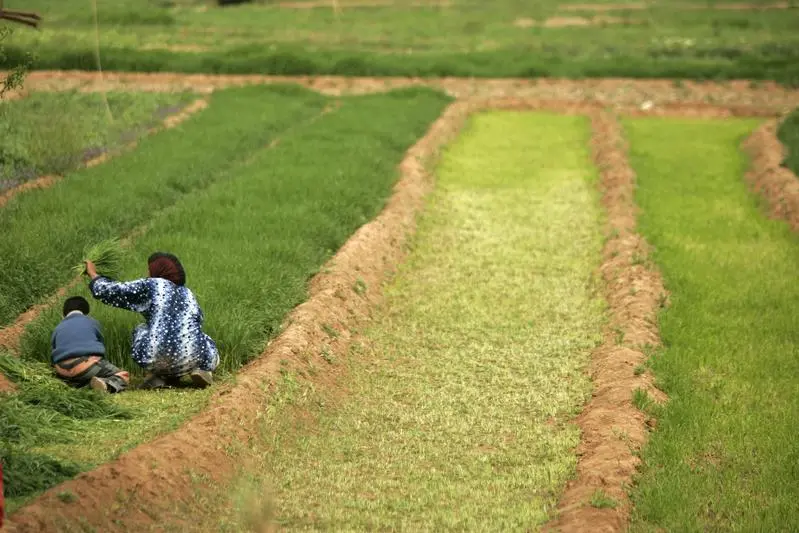PHOTO
* Widespread rains arrive in good timing
* Soft imports to reach 2 million tonnes by Dec. 30
* Wheat key staple to Morocco's stability
By Aziz El Yaakoubi
RABAT, Nov 25 (Reuters) - Morocco's vast grain-producing plains received their first rainfall this week, which should help farmers put last season's drought, the worst in decades, behind them.
Abnormally dry weather across North Africa slashed the country's cereal harvest last season to 3.35 million tonnes, down 70 percent from the previous record 11 million tonnes. Last year's drought was the worst in 30 years, the government said.
Drought added another financial burden for Morocco, as well as neighbouring Tunisia and Algeria, which faced protests over austerity measures, unemployment and distrust towards governments.
"These rains are really important because they have come in a perfect timing and covered the whole country including western plains," an agriculture ministry official said.
The National weather service said the western plains, known as Morocco's granary, including the Gharb and Doukkala, received up to 70 millimetres of rain, which also covered the central and eastern plains of Saiss and Moulouya.
"As the rains came before December, this will encourage farmers to sow more land, and obviously more than last year," the official said.
However, Morocco's dry weather requires regular rainfall throughout the whole season to keep plants healthy.
The government said it expects the economy to grow by 4.5 percent in 2017, based on a cereals harvest of 7 million tonnes.
U.S. AND EU TENDERS
Wheat is a key commodity in daily life in Morocco and agriculture accounts for more than 15 percent of the country's Gross Domestic Product (GDP).
Agriculture is also the country's biggest employer, with nearly 35 percent its workforce, but the majority of cereal-planted areas are small properties owned by subsistence farmers.
A bad season often means social problems and lower growth at a time when the government is looking to curb subsidies and spending to repair its public finances.
It also means growing pressure on the state's current account deficit from increased imports.
Morocco's grain imports this season, which started on Aug. 15, when the government reduced custom duties on soft wheat to 30 percent, would reach 2 million tonnes of soft wheat by the end of December, traders said.
"The 2 million includes around 800,000 that came from tenders to buy U.S. and European union soft wheat under preferential tariff agreements," one trader said.
Last season's imports, which run from Oct. 1 to June 30, rose slightly to 6.87 million tonnes, up from 6.34 million tonnes in the previous campaign, the country's grain agency (ONICL) data showed, as last year's bumper harvest helps mitigate the impact of the drought.
It included 3.3 million tonnes of soft wheat (up from 3.03 million tonnes from a year earlier), 830,000 tonnes of durum, 820,000 tonnes of barley and 1.9 million tonnes of corn, the data showed.
(Reporting By Aziz El Yaakoubi, editing by David Evans) ((aziz.elyaakoubi@thomsonreuters.com; +212623934595)(;))
* Soft imports to reach 2 million tonnes by Dec. 30
* Wheat key staple to Morocco's stability
By Aziz El Yaakoubi
RABAT, Nov 25 (Reuters) - Morocco's vast grain-producing plains received their first rainfall this week, which should help farmers put last season's drought, the worst in decades, behind them.
Abnormally dry weather across North Africa slashed the country's cereal harvest last season to 3.35 million tonnes, down 70 percent from the previous record 11 million tonnes. Last year's drought was the worst in 30 years, the government said.
Drought added another financial burden for Morocco, as well as neighbouring Tunisia and Algeria, which faced protests over austerity measures, unemployment and distrust towards governments.
"These rains are really important because they have come in a perfect timing and covered the whole country including western plains," an agriculture ministry official said.
The National weather service said the western plains, known as Morocco's granary, including the Gharb and Doukkala, received up to 70 millimetres of rain, which also covered the central and eastern plains of Saiss and Moulouya.
"As the rains came before December, this will encourage farmers to sow more land, and obviously more than last year," the official said.
However, Morocco's dry weather requires regular rainfall throughout the whole season to keep plants healthy.
The government said it expects the economy to grow by 4.5 percent in 2017, based on a cereals harvest of 7 million tonnes.
U.S. AND EU TENDERS
Wheat is a key commodity in daily life in Morocco and agriculture accounts for more than 15 percent of the country's Gross Domestic Product (GDP).
Agriculture is also the country's biggest employer, with nearly 35 percent its workforce, but the majority of cereal-planted areas are small properties owned by subsistence farmers.
A bad season often means social problems and lower growth at a time when the government is looking to curb subsidies and spending to repair its public finances.
It also means growing pressure on the state's current account deficit from increased imports.
Morocco's grain imports this season, which started on Aug. 15, when the government reduced custom duties on soft wheat to 30 percent, would reach 2 million tonnes of soft wheat by the end of December, traders said.
"The 2 million includes around 800,000 that came from tenders to buy U.S. and European union soft wheat under preferential tariff agreements," one trader said.
Last season's imports, which run from Oct. 1 to June 30, rose slightly to 6.87 million tonnes, up from 6.34 million tonnes in the previous campaign, the country's grain agency (ONICL) data showed, as last year's bumper harvest helps mitigate the impact of the drought.
It included 3.3 million tonnes of soft wheat (up from 3.03 million tonnes from a year earlier), 830,000 tonnes of durum, 820,000 tonnes of barley and 1.9 million tonnes of corn, the data showed.
(Reporting By Aziz El Yaakoubi, editing by David Evans) ((aziz.elyaakoubi@thomsonreuters.com; +212623934595)(;))





















